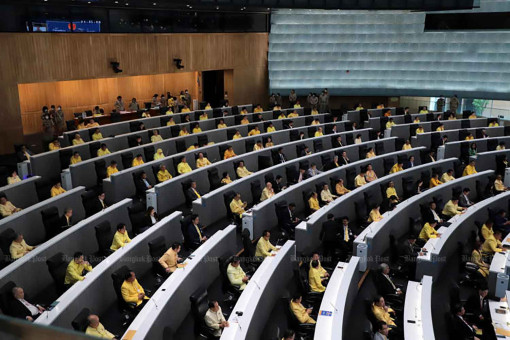
All eyes will soon be on the new Senate and its key role in charter amendment and the political power-play among coalition parties in the government.
According to observers, the Upper House is now dominated by senators believed to have Bhumjaithai links.
Both the newly elected Senate Speaker and a deputy Senate Speaker are seen as having political affiliations with the third-largest party.
The so-called “blue” bloc, a reference to Bhumjaithai, is said to be the largest by far of the three factions in the new Upper House, boosting the party’s political clout and leverage, observers said, adding the blue camp is made up of at least 150 senators.
Unlike their predecessors, the new senators will not have the power to join MPs in electing a prime minister.
However, they retain other crucial duties, including taking part in the passage of legislation and amendments to laws and the constitution.
They are also responsible for endorsing the appointment of members of independent organisations and Constitutional Court judges, and the Attorney-General, as well as keeping the executive branch in check.
Under the constitution, any proposal to amend the charter requires the support of one-third of the new 200 senators, or at least 67 senators. Without their support, charter amendments cannot go ahead.
Hurdles to charter change
Thanaporn Sriyakul, director of the Political and Public Policy Analysis Institute, told the Bangkok Post the opposition Move Forward Party’s push to amend the constitution, particularly the integral Chapters 1 and 2, and include lese majeste on the list of offences that would be pardoned under a political amnesty bill, will face another hurdle when it goes before the new Senate.
He said most senators would not oppose the charter amendment as long as Chapters 1 and 2 were left untouched, mirroring the Bhumjaithai Party’s stance on the matter.
Chapter 1 defines Thailand as a single, indivisible kingdom with a democratic regime and the King as the head of state. Chapter 2 pertains to the royal prerogatives.
Bhumjaithai leader and Interior Minister Anutin Charnvirakul earlier said Section 112 of the Criminal Code, also known as the lese majeste clause, must also be left intact.
Greater leverage
Mr Thanaporn also said he believed the blue camp of senators is already boosting Bhumjaithai’s political leverage, as evidenced in its dispute with the ruling Pheu Thai Party over the government’s plan to reclassify cannabis as a narcotic.

Thanaporn: Unlikely to back charter reform
A dispute appears to have emerged between Bhumjaithai, which advocated the decriminalisation of the plant, and Pheu Thai, which seeks to reverse that policy.
Prime Minister Srettha Thavisin is said to have ordered a cannabis control bill to be tabled before parliament, a signal that it may now be left off the narcotic drug list. Observers say this gesture could be a move to placate Bhumjaithai, which had threatened to boycott any move to return cannabis to the narcotics list.
Olarn Thinbangtieo, a political science lecturer at Burapha University in Chon Buri province, told the Bangkok Post the blue camp is not only made up of senators with links to Bhumjaithai, but also those tied to the old power clique.
“The old power group comprises former government officials, retired military officers, local politicians who are aligned with the blue camp [Bhumjaithai].
“Their main mission is to prevent the passage of any laws that will undermine their power and privilege,” Mr Olarn said.
“[With the support of the Upper House], Bhumjaithai’s political clout is now growing,” he added.
Mr Olarn echoed the view that any attempts to amend charter provisions related to the monarchy will face stiff opposition from senators affiliated with conservative groups.
“Since the Senate is dominated by senators who maintain ties with Bhumjaithai, efforts to write a new constitution may also not materialise.
“The charter may only be amended section by section,” he said.
Moreover, senators aligned with Bhumjaithai are also expected to land important posts on the Senate’s key standing committees, which deal with matters related to the ministries controlled by Bhumjaithai.

Olarn: Bhumjaithai’s clout is growing
Stithorn Thananithichot, director of the Office of Innovation for Democracy at King Prajadhipok’s Institute, told the Bangkok Post that senators from the blue camp will play a decisive role in charter amendments and the selection of members of independent agencies.
“Anyone [in or outside of the Senate] who wants to achieve their aims must negotiate with these senators… Certain charter provisions can only be amended if the senators agree with them,” Mr Stithorn said.
“While the previous 250 junta-appointed senators were controlled by ‘the uncles’, the new senate is dominated by the blue camp which also maintains good ties with the same uncles.
The “uncles” refer to former prime minister Prayut Chan-o-cha and Gen Prawit Wongsuwon, the leader of the Palang Pracharath Party.

Stithorn: New lot still has ties with uncles

